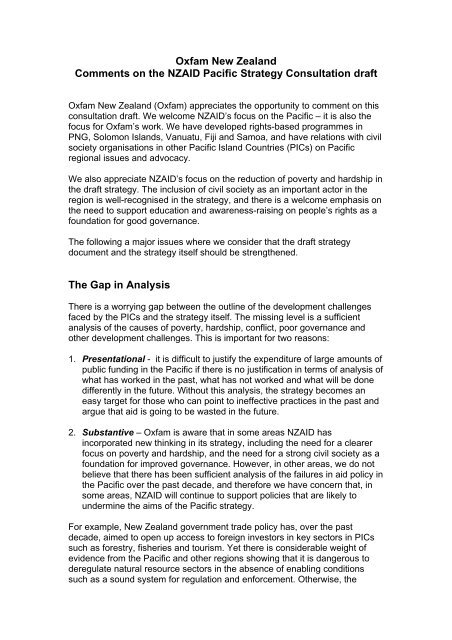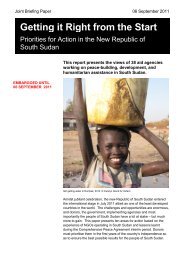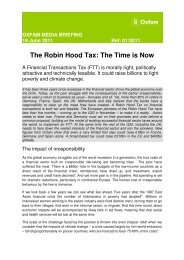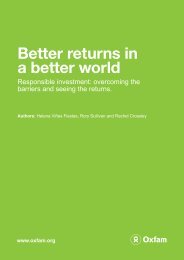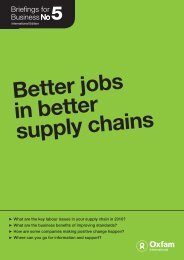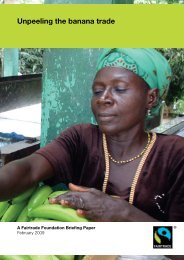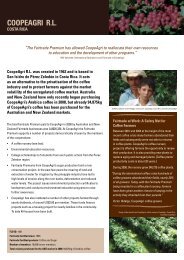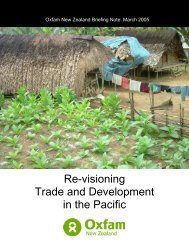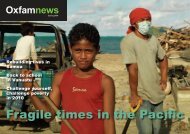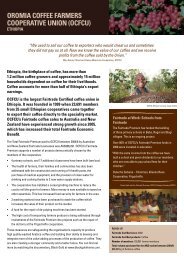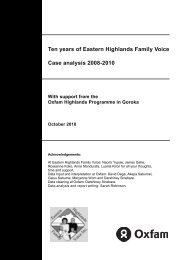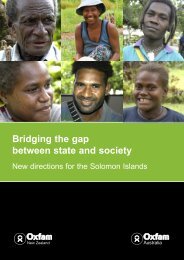Oxfam New Zealand Comments on the NZAID Pacific Strategy ...
Oxfam New Zealand Comments on the NZAID Pacific Strategy ...
Oxfam New Zealand Comments on the NZAID Pacific Strategy ...
You also want an ePaper? Increase the reach of your titles
YUMPU automatically turns print PDFs into web optimized ePapers that Google loves.
<str<strong>on</strong>g>Oxfam</str<strong>on</strong>g> <str<strong>on</strong>g>New</str<strong>on</strong>g> <str<strong>on</strong>g>Zealand</str<strong>on</strong>g><br />
<str<strong>on</strong>g>Comments</str<strong>on</strong>g> <strong>on</strong> <strong>the</strong> <strong>NZAID</strong> <strong>Pacific</strong> <strong>Strategy</strong> C<strong>on</strong>sultati<strong>on</strong> draft<br />
<str<strong>on</strong>g>Oxfam</str<strong>on</strong>g> <str<strong>on</strong>g>New</str<strong>on</strong>g> <str<strong>on</strong>g>Zealand</str<strong>on</strong>g> (<str<strong>on</strong>g>Oxfam</str<strong>on</strong>g>) appreciates <strong>the</strong> opportunity to comment <strong>on</strong> this<br />
c<strong>on</strong>sultati<strong>on</strong> draft. We welcome <strong>NZAID</strong>’s focus <strong>on</strong> <strong>the</strong> <strong>Pacific</strong> – it is also <strong>the</strong><br />
focus for <str<strong>on</strong>g>Oxfam</str<strong>on</strong>g>’s work. We have developed rights-based programmes in<br />
PNG, Solom<strong>on</strong> Islands, Vanuatu, Fiji and Samoa, and have relati<strong>on</strong>s with civil<br />
society organisati<strong>on</strong>s in o<strong>the</strong>r <strong>Pacific</strong> Island Countries (PICs) <strong>on</strong> <strong>Pacific</strong><br />
regi<strong>on</strong>al issues and advocacy.<br />
We also appreciate <strong>NZAID</strong>’s focus <strong>on</strong> <strong>the</strong> reducti<strong>on</strong> of poverty and hardship in<br />
<strong>the</strong> draft strategy. The inclusi<strong>on</strong> of civil society as an important actor in <strong>the</strong><br />
regi<strong>on</strong> is well-recognised in <strong>the</strong> strategy, and <strong>the</strong>re is a welcome emphasis <strong>on</strong><br />
<strong>the</strong> need to support educati<strong>on</strong> and awareness-raising <strong>on</strong> people’s rights as a<br />
foundati<strong>on</strong> for good governance.<br />
The following a major issues where we c<strong>on</strong>sider that <strong>the</strong> draft strategy<br />
document and <strong>the</strong> strategy itself should be streng<strong>the</strong>ned.<br />
The Gap in Analysis<br />
There is a worrying gap between <strong>the</strong> outline of <strong>the</strong> development challenges<br />
faced by <strong>the</strong> PICs and <strong>the</strong> strategy itself. The missing level is a sufficient<br />
analysis of <strong>the</strong> causes of poverty, hardship, c<strong>on</strong>flict, poor governance and<br />
o<strong>the</strong>r development challenges. This is important for two reas<strong>on</strong>s:<br />
1. Presentati<strong>on</strong>al - it is difficult to justify <strong>the</strong> expenditure of large amounts of<br />
public funding in <strong>the</strong> <strong>Pacific</strong> if <strong>the</strong>re is no justificati<strong>on</strong> in terms of analysis of<br />
what has worked in <strong>the</strong> past, what has not worked and what will be d<strong>on</strong>e<br />
differently in <strong>the</strong> future. Without this analysis, <strong>the</strong> strategy becomes an<br />
easy target for those who can point to ineffective practices in <strong>the</strong> past and<br />
argue that aid is going to be wasted in <strong>the</strong> future.<br />
2. Substantive – <str<strong>on</strong>g>Oxfam</str<strong>on</strong>g> is aware that in some areas <strong>NZAID</strong> has<br />
incorporated new thinking in its strategy, including <strong>the</strong> need for a clearer<br />
focus <strong>on</strong> poverty and hardship, and <strong>the</strong> need for a str<strong>on</strong>g civil society as a<br />
foundati<strong>on</strong> for improved governance. However, in o<strong>the</strong>r areas, we do not<br />
believe that <strong>the</strong>re has been sufficient analysis of <strong>the</strong> failures in aid policy in<br />
<strong>the</strong> <strong>Pacific</strong> over <strong>the</strong> past decade, and <strong>the</strong>refore we have c<strong>on</strong>cern that, in<br />
some areas, <strong>NZAID</strong> will c<strong>on</strong>tinue to support policies that are likely to<br />
undermine <strong>the</strong> aims of <strong>the</strong> <strong>Pacific</strong> strategy.<br />
For example, <str<strong>on</strong>g>New</str<strong>on</strong>g> <str<strong>on</strong>g>Zealand</str<strong>on</strong>g> government trade policy has, over <strong>the</strong> past<br />
decade, aimed to open up access to foreign investors in key sectors in PICs<br />
such as forestry, fisheries and tourism. Yet <strong>the</strong>re is c<strong>on</strong>siderable weight of<br />
evidence from <strong>the</strong> <strong>Pacific</strong> and o<strong>the</strong>r regi<strong>on</strong>s showing that it is dangerous to<br />
deregulate natural resource sectors in <strong>the</strong> absence of enabling c<strong>on</strong>diti<strong>on</strong>s<br />
such as a sound system for regulati<strong>on</strong> and enforcement. O<strong>the</strong>rwise, <strong>the</strong>
esults are likely to be unsustainable resource exploitati<strong>on</strong>, a lack of local<br />
benefits, corrupti<strong>on</strong>, local resentments and c<strong>on</strong>flict.<br />
The PICs have suffered from <strong>the</strong>se impacts. The results have been<br />
experienced in sectors such as mining (most notably in Bougainville), forestry<br />
and to some extent in tourism and fisheries.<br />
The questi<strong>on</strong> for <strong>the</strong> strategy is what will change that will prevent <strong>the</strong>se<br />
problems from occurring in future and to ensure that future development<br />
benefits <strong>the</strong> poor and vulnerable people of <strong>the</strong> <strong>Pacific</strong>, ra<strong>the</strong>r than creating<br />
fur<strong>the</strong>r hardship. <str<strong>on</strong>g>Oxfam</str<strong>on</strong>g> is c<strong>on</strong>cerned that <strong>the</strong>re has not been <strong>the</strong> analysis to<br />
understand <strong>the</strong> adverse impacts in <strong>the</strong> past and that <strong>the</strong> basic ec<strong>on</strong>omic<br />
policy prescripti<strong>on</strong>s have not changed.<br />
If <strong>the</strong> strategy was built <strong>on</strong> a str<strong>on</strong>g analysis of <strong>the</strong> problems (eg. poor<br />
regulati<strong>on</strong> of corporate activity resulting in unsustainable resource use and<br />
corrupti<strong>on</strong>) it would adopt a different set of policies in <strong>the</strong> future. For example,<br />
<strong>the</strong> governance secti<strong>on</strong> of <strong>the</strong> <strong>Strategy</strong> puts <strong>the</strong> entire <strong>on</strong>us <strong>on</strong> failures of <strong>the</strong><br />
State (and by implicati<strong>on</strong>, failures of <strong>Pacific</strong> people to demand better<br />
governance) without recognising <strong>the</strong> role for str<strong>on</strong>ger and more transparent<br />
regulati<strong>on</strong> of business (para 19).<br />
Similarly, <strong>the</strong> secti<strong>on</strong> <strong>on</strong> ec<strong>on</strong>omic growth <strong>on</strong>ly talks about “supporting better<br />
ec<strong>on</strong>omic management” and “mechanisms to assist private sector<br />
development” (para 21), ra<strong>the</strong>r than adopti<strong>on</strong> of regulati<strong>on</strong> to ensure that<br />
private sector activity c<strong>on</strong>tributes to pro-poor growth ra<strong>the</strong>r than undermining<br />
it.<br />
ONZ recommends that, where <strong>the</strong>re is credible analysis of <strong>the</strong> causes of<br />
development challenges, it should be included in an Annex to <strong>the</strong><br />
<strong>Strategy</strong>, and cross-checked with <strong>the</strong> proposals in <strong>the</strong> <strong>Strategy</strong> to<br />
ensure <strong>the</strong>re is coherence.<br />
Where such analysis does not exist, <strong>the</strong> commitment in <strong>the</strong> strategy to<br />
“sound, evidence-based analysis” should be operati<strong>on</strong>alised through a<br />
commitment to prior assessment of major policy positi<strong>on</strong>s that would<br />
affect <strong>Pacific</strong> peoples. This should apply to all significant policies of<br />
<strong>NZAID</strong> or any o<strong>the</strong>r part of <strong>the</strong> <str<strong>on</strong>g>New</str<strong>on</strong>g> <str<strong>on</strong>g>Zealand</str<strong>on</strong>g> government. Such poverty<br />
and social impact assessments are an integral part of <strong>the</strong> basis for<br />
policy coherence and are increasingly used by agencies such as <strong>the</strong><br />
World Bank. They should be a part of <strong>NZAID</strong>’s <strong>on</strong>going policy<br />
formulati<strong>on</strong> and review processes.<br />
The lack of Policy Coherence, especially Trade Policy<br />
The paper is silent <strong>on</strong> trade policy, as <strong>on</strong>e of <strong>the</strong> major policy issues that will<br />
affect <strong>the</strong> development prospects of <strong>the</strong> PICs. In o<strong>the</strong>r c<strong>on</strong>texts (eg.<br />
negotiati<strong>on</strong>s in <strong>the</strong> WTO Doha Round, accessi<strong>on</strong> negotiati<strong>on</strong>s with countries<br />
such as T<strong>on</strong>ga and Samoa, and in <strong>the</strong> <strong>Pacific</strong> Plan), <strong>the</strong> <str<strong>on</strong>g>New</str<strong>on</strong>g> <str<strong>on</strong>g>Zealand</str<strong>on</strong>g>
government is saying that trade liberalisati<strong>on</strong> is vital for <strong>the</strong> future of <strong>the</strong><br />
<strong>Pacific</strong>. It is seen to have huge benefits for development prospects in <strong>the</strong><br />
regi<strong>on</strong>.<br />
O<strong>the</strong>rs, including <str<strong>on</strong>g>Oxfam</str<strong>on</strong>g> agree that trade is likely to be important in <strong>the</strong><br />
ec<strong>on</strong>omic future of <strong>the</strong> <strong>Pacific</strong> and trade policy is crucial for achieving<br />
equitable and sustainable patterns of development. However, we emphasise<br />
<strong>the</strong> potential risks of adverse development impacts that are likely to result<br />
from poorly designed trade liberalisati<strong>on</strong>, implemented too rapidly, at an<br />
extremely early stage in <strong>the</strong> development path of PICs, sequenced before<br />
PICs have a sound regulatory framework in place, with little or no c<strong>on</strong>sultati<strong>on</strong><br />
and public educati<strong>on</strong>. The lack of <strong>the</strong>se necessary prior c<strong>on</strong>diti<strong>on</strong>s and <strong>the</strong><br />
severe structural disadvantages of <strong>the</strong> <strong>Pacific</strong> nati<strong>on</strong>s (some of which are<br />
referenced in para 8) are likely to mean that trade liberalisati<strong>on</strong> carries major<br />
risks for <strong>the</strong> poor and vulnerable people of <strong>the</strong> <strong>Pacific</strong>.<br />
While <str<strong>on</strong>g>Oxfam</str<strong>on</strong>g> and MFAT do not agree <strong>on</strong> appropriate policies for <strong>the</strong> <strong>Pacific</strong>,<br />
we do agree that <strong>the</strong>re will be profound development impacts. Therefore, it is<br />
not credible for <strong>the</strong> draft strategy to ignore <strong>the</strong> likely impact of <strong>the</strong>se trade<br />
negotiati<strong>on</strong>s. It is especially surprising that <strong>the</strong>se are not central to <strong>the</strong><br />
strategy since <strong>the</strong> <str<strong>on</strong>g>New</str<strong>on</strong>g> <str<strong>on</strong>g>Zealand</str<strong>on</strong>g> government is deeply involved in promoting<br />
<strong>the</strong>se policies (as opposed to many of <strong>the</strong> o<strong>the</strong>r issues in <strong>the</strong> strategy which<br />
are primarily determined from within <strong>the</strong> PICs).<br />
It should also be recognised that <strong>the</strong> outcomes of trade negotiati<strong>on</strong>s will also<br />
affect <strong>the</strong> ability of PICs to achieve a number of <strong>the</strong> development outcomes<br />
that are incorporated into <strong>the</strong> <strong>Strategy</strong>. For example, <strong>the</strong> ability of PIC<br />
governments to institute policies that would increase value added (last bullet<br />
point in para 21) will be influenced by <strong>the</strong> outcome of negotiati<strong>on</strong>s in <strong>the</strong><br />
WTO, WTO accessi<strong>on</strong> agreements, EPA negotiati<strong>on</strong>s and PACER<br />
negotiati<strong>on</strong>s. In <strong>the</strong> WTO, agreements <strong>on</strong> subsidies, Trade Related<br />
Investment Measures and <strong>the</strong> General Agreement <strong>on</strong> Trade in Services have<br />
<strong>the</strong> potential to limit <strong>the</strong> scope and type of policies that governments can use<br />
to subsidise certain kinds of ec<strong>on</strong>omic activity, require c<strong>on</strong>diti<strong>on</strong>s of investors<br />
or provide incentives for developments such as processing raw materials.<br />
These issues were, for example, part of <strong>the</strong> demands made by <strong>the</strong> WTO<br />
Accessi<strong>on</strong> Working party (including <str<strong>on</strong>g>New</str<strong>on</strong>g> <str<strong>on</strong>g>Zealand</str<strong>on</strong>g>) during T<strong>on</strong>ga’s accessi<strong>on</strong>,<br />
and T<strong>on</strong>ga gave up <strong>the</strong> right to provide incentives for companies to undertake<br />
value added processing activities in its WTO accessi<strong>on</strong> agreement.<br />
In some areas, <strong>the</strong> draft strategy recognises <strong>the</strong> lack of capacity of civil<br />
society to hold <strong>the</strong>ir governments to account, for example in combating<br />
corrupti<strong>on</strong> or <strong>the</strong> delivery of essential services. However, <strong>the</strong> strategy has no<br />
corresp<strong>on</strong>ding recogniti<strong>on</strong> of <strong>the</strong> urgent need for civil society capacity building<br />
in order to c<strong>on</strong>tribute to sound policy making <strong>on</strong> trade or to hold <strong>the</strong>ir<br />
governments to account <strong>on</strong> trade policy. This lack of capacity has been<br />
previously identified as a problem by <strong>NZAID</strong> and o<strong>the</strong>rs and should be part of<br />
a coherent policy towards trade and development issues in <strong>the</strong> <strong>Pacific</strong>.
The lack of inclusi<strong>on</strong> of trade policy in <strong>the</strong> <strong>Pacific</strong> strategy is surprising in <strong>the</strong><br />
light of <strong>the</strong> recent Ministerial Review of Progress in Implementing 2001<br />
Cabinet Recommendati<strong>on</strong>s establishing <strong>NZAID</strong> (<strong>the</strong> Waring review). While <strong>the</strong><br />
findings of <strong>the</strong> review have <strong>on</strong>ly recently been made public, <strong>the</strong>y were<br />
presumably known to <strong>NZAID</strong> during <strong>the</strong> formative stage of preparing this draft<br />
c<strong>on</strong>sultati<strong>on</strong>.<br />
The Waring Review c<strong>on</strong>cluded that “<strong>NZAID</strong>’s effectiveness in <strong>the</strong> <strong>Pacific</strong><br />
regi<strong>on</strong> is inhibited by <strong>the</strong> lack of coherence strategy covering all <str<strong>on</strong>g>New</str<strong>on</strong>g> <str<strong>on</strong>g>Zealand</str<strong>on</strong>g><br />
agencies operating in <strong>the</strong> regi<strong>on</strong>.” (page 25).<br />
The review’s recommendati<strong>on</strong> 12 states:<br />
“That a programmed and inclusive strategic process, directed at coherence,<br />
operati<strong>on</strong>al sustainability and effectiveness of delivery, which recognises <strong>the</strong><br />
<strong>Pacific</strong> strengths of <strong>NZAID</strong>, be established as a matter of urgency for <strong>the</strong><br />
Government as a whole, with reliable regular mechanisms of accountability<br />
and reporting to enable a cohesive multi-agency process for <strong>Pacific</strong><br />
engagement.” (page 25).<br />
<strong>NZAID</strong> has a clear mandate to work <strong>on</strong> trade in <strong>the</strong> <strong>Pacific</strong>. <strong>NZAID</strong>’s policy<br />
‘Harnessing Trade for Development’ calls for critical factors to be in place for<br />
trade to c<strong>on</strong>tribute to development. It is clear that <strong>the</strong>se factors are not in<br />
place in <strong>the</strong> <strong>Pacific</strong>.<br />
Therefore a relevant questi<strong>on</strong> for this strategy is whe<strong>the</strong>r <strong>NZAID</strong> will apply its<br />
influence to change put in place <strong>the</strong> necessary c<strong>on</strong>diti<strong>on</strong>s, implying a slow<br />
pace of negotiati<strong>on</strong>s, or questi<strong>on</strong> <strong>the</strong> appropriateness of <strong>the</strong> trade<br />
liberalisati<strong>on</strong> initiatives to <strong>the</strong> <strong>Pacific</strong>.<br />
<str<strong>on</strong>g>Oxfam</str<strong>on</strong>g> c<strong>on</strong>siders that it is vital that <strong>NZAID</strong>’s <strong>Pacific</strong> strategy does not duck <strong>the</strong><br />
challenge of policy coherence. Trade policy is important to <strong>the</strong> <strong>Pacific</strong>, it is<br />
important to <strong>the</strong> achievement of <strong>the</strong> aims of this strategy and it is important<br />
that <strong>NZAID</strong> play an active role in shaping <str<strong>on</strong>g>New</str<strong>on</strong>g> <str<strong>on</strong>g>Zealand</str<strong>on</strong>g>’s trade policy so that it<br />
supports poor and vulnerable people in <strong>the</strong> <strong>Pacific</strong>.<br />
We <strong>the</strong>refore recommend that <strong>the</strong> strategy include two additi<strong>on</strong>al <strong>NZAID</strong><br />
programme areas to:<br />
• Support <strong>the</strong> <strong>Pacific</strong> governments to build <strong>the</strong>ir capacity, and that<br />
of civil society, to be able to undertake objective and independent<br />
research and assessment, to develop alternative policy opti<strong>on</strong>s<br />
(as part of <strong>the</strong> commitment to “sound, evidence-based policy”),<br />
and to build a basis for wide c<strong>on</strong>sultati<strong>on</strong> and public educati<strong>on</strong><br />
(as part of <strong>the</strong> commitment to good governance)<br />
• Strive for policy coherence towards <strong>the</strong> <strong>Pacific</strong> within <strong>the</strong> <str<strong>on</strong>g>New</str<strong>on</strong>g><br />
<str<strong>on</strong>g>Zealand</str<strong>on</strong>g> government and with multilateral agencies, including<br />
trade policy (extend Para 59). This programme area should be<br />
explicit about <strong>NZAID</strong>’s own capacity building needs and <strong>the</strong> ways<br />
in which <strong>the</strong> <str<strong>on</strong>g>New</str<strong>on</strong>g> <str<strong>on</strong>g>Zealand</str<strong>on</strong>g> government could be engaging with
civil society and dem<strong>on</strong>strating that it is putting into practice <strong>the</strong><br />
principles of evidence-based policy making, transparency of<br />
informati<strong>on</strong> and prior informed c<strong>on</strong>sent.<br />
The Missing Opportunity <strong>on</strong> Labour Mobility<br />
Similarly, <strong>the</strong> draft <strong>Strategy</strong> is virtually silent <strong>on</strong> <strong>on</strong>e of <strong>the</strong> o<strong>the</strong>r major<br />
potential influences over <strong>the</strong> development prospects for <strong>the</strong> <strong>Pacific</strong> – labour<br />
mobility. ONZ c<strong>on</strong>siders that <strong>the</strong> current policy frameworks for <strong>the</strong> movement<br />
of labour fail to deliver <strong>on</strong> <strong>the</strong> potential benefits for <strong>the</strong> PICs, for <str<strong>on</strong>g>New</str<strong>on</strong>g> <str<strong>on</strong>g>Zealand</str<strong>on</strong>g><br />
and for <strong>the</strong> <strong>Pacific</strong> workers <strong>the</strong>mselves.<br />
ONZ c<strong>on</strong>siders that <strong>the</strong> strategy could play a key role in initiating <strong>the</strong><br />
development of an improved framework that addresses <strong>the</strong> problems such as<br />
<strong>the</strong> recruitment of experienced professi<strong>on</strong>als from <strong>the</strong> <strong>Pacific</strong>, <strong>the</strong>reby<br />
c<strong>on</strong>tributing to ‘brain drain’, <strong>the</strong> shortages of labour at key times for <strong>the</strong> <str<strong>on</strong>g>New</str<strong>on</strong>g><br />
<str<strong>on</strong>g>Zealand</str<strong>on</strong>g> agriculture and horticulture sector, c<strong>on</strong>cerns over <strong>the</strong> potential for<br />
workers to overstay <strong>the</strong>ir visas, and social problems caused when men or<br />
women leave <strong>the</strong>ir families and communities to work overseas.<br />
ONZ believes that addressing <strong>the</strong>se problems has <strong>the</strong> potential to create a<br />
framework that could provide more benefits to all parties. Substantial<br />
improvement towards a so-called ‘win-win’ framework is possible. We have<br />
forwarded documents <strong>on</strong> seas<strong>on</strong>al movement of labour, written by Nic<br />
Maclellan of <str<strong>on</strong>g>Oxfam</str<strong>on</strong>g>’s <strong>Pacific</strong> Programme, to <strong>NZAID</strong>’s <strong>Pacific</strong> Group Director<br />
following <strong>the</strong> recent c<strong>on</strong>sultati<strong>on</strong> meeting <strong>on</strong> <strong>the</strong> draft <strong>Pacific</strong> strategy.<br />
<str<strong>on</strong>g>Oxfam</str<strong>on</strong>g> recommends that <strong>the</strong> <strong>Strategy</strong> includes a secti<strong>on</strong> that seeks<br />
engagement with PIC governments, NZ government departments and<br />
civil society in <str<strong>on</strong>g>New</str<strong>on</strong>g> <str<strong>on</strong>g>Zealand</str<strong>on</strong>g> and <strong>the</strong> <strong>Pacific</strong>, including trade uni<strong>on</strong>s, to<br />
develop an improved framework for migrati<strong>on</strong> and seas<strong>on</strong>al labour<br />
mobility.<br />
Streng<strong>the</strong>ning <strong>NZAID</strong>’s Understanding of Pro-Poor Growth<br />
“Is <strong>the</strong> reas<strong>on</strong> we talk about growth so much that we understand so little about<br />
it?” Dani Rodrik, Growth Strategies, Harvard University 2004.<br />
We agree with <strong>the</strong> inclusi<strong>on</strong> in <strong>the</strong> strategy of a need for policy dialogue that is<br />
“c<strong>on</strong>ducive to pro-poor and broad-based growth” (para 55). However, <strong>the</strong>re<br />
are many different understandings of pro-poor growth and <strong>the</strong> strategy does<br />
little to define what is meant by <strong>the</strong>se terms. There is new analysis emerging<br />
<strong>on</strong> <strong>the</strong> policy basis for pro-poor outcomes, not <strong>on</strong>ly from ec<strong>on</strong>omic historians<br />
like Ha-Jo<strong>on</strong> Chang of Cambridge University, or leading academics such as<br />
Deepak Nayyar (Delhi University) and Dani Rodrik of Harvard University (cited<br />
above), but also new thinking from <strong>the</strong> more pro-liberalisati<strong>on</strong> instituti<strong>on</strong>s,<br />
such as <strong>the</strong> recent World Bank report “Ec<strong>on</strong>omic Growth in <strong>the</strong> 1990s:<br />
Learning from a Decade of Reform”.
While we have reservati<strong>on</strong>s with some of <strong>the</strong> analysis in <strong>the</strong> World Bank<br />
report, it usefully moves away from a <strong>on</strong>e-size-fits-all approach to identify <strong>the</strong><br />
need for str<strong>on</strong>ger research and understanding <strong>on</strong> <strong>the</strong> complexities within each<br />
society. This is a process that we hope <strong>NZAID</strong> will engage in, toge<strong>the</strong>r with<br />
governments of those countries and civil society. Such an approach would<br />
support detailed analysis to understand <strong>the</strong> causes of poverty and hardship,<br />
ensure <strong>the</strong>re are c<strong>on</strong>sultati<strong>on</strong>s with a wide range of stakeholders (including<br />
<strong>the</strong> poor) to identify policy opti<strong>on</strong>s, and to support real democratic debate <strong>on</strong><br />
<strong>the</strong> decisi<strong>on</strong>s to be taken. In our experience, this is far from <strong>the</strong> current ways<br />
in which policy dialogue is undertaken.<br />
While civil society organisati<strong>on</strong>s do not have any claim to know <strong>the</strong> answers,<br />
we would welcome a dialogue with <strong>NZAID</strong> <strong>on</strong> <strong>the</strong>se issues. The base of<br />
evidence that we use tends to be different to that used by governments. We<br />
would be pleased to provide some of <strong>the</strong> titles and a summary of <strong>the</strong> research<br />
to inform <strong>NZAID</strong>’s views <strong>on</strong> appropriate pro-poor growth strategies for small<br />
island states. We would also be interested to see <strong>the</strong> research and evidence<br />
that <strong>NZAID</strong> is using to inform its views of what c<strong>on</strong>stitutes pro-poor growth.<br />
Many of <strong>the</strong> policies that have been promoted to PICs in <strong>the</strong> past are<br />
c<strong>on</strong>tested. Over <strong>the</strong> past decade, d<strong>on</strong>or governments and multilateral<br />
instituti<strong>on</strong>s have changed <strong>the</strong> language <strong>the</strong>y use to describe <strong>the</strong>ir policies.<br />
However, <strong>the</strong> specific policies have been far slower to change and d<strong>on</strong>ors and<br />
multilateral instituti<strong>on</strong>s have c<strong>on</strong>tinued to press for a relatively standard set of<br />
policy prescripti<strong>on</strong>s, including trade liberalisati<strong>on</strong>, privatisati<strong>on</strong>, deregulati<strong>on</strong><br />
and fiscal austerity.<br />
These policies have all been advocated str<strong>on</strong>gly in <strong>the</strong> <strong>Pacific</strong>, even though<br />
<strong>the</strong>re is growing evidence (some of it from <strong>the</strong> multilateral instituti<strong>on</strong>s<br />
<strong>the</strong>mselves) questi<strong>on</strong>ing whe<strong>the</strong>r <strong>the</strong>se policies should be applied uniformly<br />
across all societies, raising issues of sequencing, appropriateness for less<br />
developed and vulnerable states, <strong>the</strong>ir impact <strong>on</strong> inequality and <strong>the</strong>ir<br />
envir<strong>on</strong>mental sustainability.<br />
D<strong>on</strong>ors have an extremely powerful role in <strong>the</strong> <strong>Pacific</strong>, and <strong>the</strong>ir influence in<br />
policy formulati<strong>on</strong> has extended far bey<strong>on</strong>d being <strong>on</strong>e of many inputs into a<br />
policy making process. This power and influence carries with it <strong>the</strong><br />
resp<strong>on</strong>sibility that d<strong>on</strong>ors will <strong>on</strong>ly advocate a particular policy when <strong>the</strong>y have<br />
very str<strong>on</strong>g evidence that it will work for <strong>the</strong> poor.<br />
It would be helpful if <strong>the</strong> current <strong>NZAID</strong> strategy could make it clear that<br />
<strong>NZAID</strong> will seriously invest in evidence-based policy analysis, derived from<br />
detailed assessment of <strong>the</strong> reality of policy impact ra<strong>the</strong>r than <strong>on</strong> ec<strong>on</strong>omic<br />
models, ensure <strong>the</strong>re is adequate examinati<strong>on</strong> of policy alternatives and<br />
ensure <strong>the</strong>re is transparency and c<strong>on</strong>sultati<strong>on</strong> in policy-making.<br />
Therefore, <str<strong>on</strong>g>Oxfam</str<strong>on</strong>g> recommends that <strong>the</strong> <strong>Strategy</strong>:<br />
• Includes a clear statement that <strong>NZAID</strong> is in a supporting role to<br />
PIC governments and will review <strong>the</strong> prescriptive policy advice
that <strong>the</strong> <str<strong>on</strong>g>New</str<strong>on</strong>g> <str<strong>on</strong>g>Zealand</str<strong>on</strong>g> government has given in <strong>the</strong> past,<br />
particularly with regard to ec<strong>on</strong>omic policy<br />
• Includes <strong>the</strong> statement that <strong>NZAID</strong> does not support inappropriate<br />
ec<strong>on</strong>omic c<strong>on</strong>diti<strong>on</strong>ality such as trade liberalisati<strong>on</strong>, privatisati<strong>on</strong>,<br />
financial liberalisati<strong>on</strong> or fiscal austerity, and will work within <strong>the</strong><br />
<str<strong>on</strong>g>New</str<strong>on</strong>g> <str<strong>on</strong>g>Zealand</str<strong>on</strong>g> government to influence regi<strong>on</strong>al and multilateral<br />
instituti<strong>on</strong>s to refrain from applying prescriptive policy advice<br />
and/or aid c<strong>on</strong>diti<strong>on</strong>ality.<br />
• Includes a statement that <strong>NZAID</strong> will develop an evidence base for<br />
its policy dialogue, to include social and envir<strong>on</strong>ment impact<br />
assessment, wherever possible, including <strong>the</strong> full participati<strong>on</strong> of<br />
groups within society that will be affected by <strong>the</strong> policy.<br />
Principles for military interventi<strong>on</strong><br />
The Regi<strong>on</strong>al Assistance Missi<strong>on</strong> to Solom<strong>on</strong> Islands (RAMSI) has been a<br />
significant regi<strong>on</strong>al initiative. But as <strong>NZAID</strong> sets out its strategy in coming<br />
years, <strong>the</strong>re is an urgent need to set clear objectives and end dates for <strong>the</strong><br />
regi<strong>on</strong>al interventi<strong>on</strong>, and return relati<strong>on</strong>s with <strong>the</strong> Solom<strong>on</strong> Islands to regular<br />
bilateral and multilateral linkages.<br />
RAMSI derived much of its early legitimacy, particularly in <strong>the</strong> eyes of<br />
Solom<strong>on</strong> Island citizens, from being a “law and order” or a “peace and<br />
security” interventi<strong>on</strong>, and <strong>the</strong> fact that it was invited in to achieve <strong>the</strong>se aims.<br />
Today it is evident that RAMSI has become a “state-building” interventi<strong>on</strong>.<br />
The legacy of a successful initial interventi<strong>on</strong>, restoring ‘law and order’, is<br />
being used to limit discussi<strong>on</strong> of <strong>the</strong> more complex, open-ended, and less<br />
tangible phase of building government capacity. The issues of lack of<br />
participati<strong>on</strong>, communicati<strong>on</strong> and accountability are impacting up<strong>on</strong> <strong>the</strong><br />
essential dynamic of legitimacy or social c<strong>on</strong>tract between RAMSI and <strong>the</strong><br />
local populati<strong>on</strong>. There is a tensi<strong>on</strong> between RAMSI’s self image as a<br />
successful external assistance missi<strong>on</strong>, compared with many Solom<strong>on</strong><br />
Islanders’ more critical percepti<strong>on</strong>s of RAMSI as a de facto government.<br />
RAMSI needs to do more to engage with civil society and communities,<br />
harnessing <strong>the</strong> knowledge and skills that exist within <strong>the</strong>se groups.<br />
In cases of regi<strong>on</strong>al interventi<strong>on</strong>, <str<strong>on</strong>g>Oxfam</str<strong>on</strong>g> recommends that <strong>NZAID</strong>’s<br />
strategy support <strong>Pacific</strong> Islanders to address issues that go to <strong>the</strong> heart<br />
of c<strong>on</strong>flict and address <strong>the</strong> challenge of creating a lasting peace: land<br />
disputes, resource extracti<strong>on</strong>, benefit sharing, opportunities for youth<br />
and community-based violence.<br />
More broadly, <strong>the</strong> strategy should recognise <strong>the</strong> important role for <str<strong>on</strong>g>New</str<strong>on</strong>g><br />
<str<strong>on</strong>g>Zealand</str<strong>on</strong>g> to ensure that projects like RAMSI are truly regi<strong>on</strong>al, ra<strong>the</strong>r than<br />
Australian-driven, and reflect <strong>the</strong> interests of all members of <strong>the</strong> <strong>Pacific</strong><br />
Islands Forum.
<strong>NZAID</strong> role in <strong>Pacific</strong> land tenure reform<br />
<str<strong>on</strong>g>Oxfam</str<strong>on</strong>g> questi<strong>on</strong>s whe<strong>the</strong>r it is appropriate for <strong>NZAID</strong> to adopt a programme<br />
aims such as ‘supporting appropriate land tenure’ (para 21). The questi<strong>on</strong> of<br />
what is ‘appropriate’ is c<strong>on</strong>tentious, particularly when part of a foreign d<strong>on</strong>or<br />
strategy. The c<strong>on</strong>text is that <strong>the</strong> EU, <strong>the</strong> Australian government and o<strong>the</strong>rs<br />
have called for privatisati<strong>on</strong> of land and fewer restricti<strong>on</strong>s <strong>on</strong> ownership by<br />
foreigners. For example, <strong>the</strong> EU has included a request for greater foreign<br />
ownership of land in its requests of two <strong>Pacific</strong> nati<strong>on</strong>s under current WTO<br />
GATS negotiati<strong>on</strong>s.<br />
The inclusi<strong>on</strong> of land tenure reform in <strong>the</strong> secti<strong>on</strong> that relates to ec<strong>on</strong>omic<br />
growth indicates that <str<strong>on</strong>g>New</str<strong>on</strong>g> <str<strong>on</strong>g>Zealand</str<strong>on</strong>g>’s interests are also driven by ec<strong>on</strong>omic<br />
c<strong>on</strong>siderati<strong>on</strong>s. This is a dangerous approach, given that land is not <strong>on</strong>ly an<br />
ec<strong>on</strong>omic asset but is central to <strong>the</strong> identity of many <strong>Pacific</strong> peoples and<br />
potentially a source of bitter c<strong>on</strong>flict.<br />
The soluti<strong>on</strong> is not just to shift land tenure into ano<strong>the</strong>r secti<strong>on</strong> of <strong>the</strong> strategy,<br />
but to questi<strong>on</strong> why <strong>NZAID</strong> should be involved. It is not enough to identify that<br />
land tenure is an important issue for <strong>the</strong> <strong>Pacific</strong>. As is clear from <strong>the</strong> <strong>NZAID</strong><br />
<strong>Strategy</strong>, d<strong>on</strong>or funds are a small part of <strong>the</strong> overall funding available to PIC<br />
governments and <strong>the</strong>re need to be good reas<strong>on</strong>s why d<strong>on</strong>ors should be<br />
involved. In this area, <strong>the</strong>re are very good reas<strong>on</strong>s why d<strong>on</strong>ors should not be<br />
involved and a real questi<strong>on</strong> over <str<strong>on</strong>g>New</str<strong>on</strong>g> <str<strong>on</strong>g>Zealand</str<strong>on</strong>g>’s value added.<br />
<str<strong>on</strong>g>Oxfam</str<strong>on</strong>g> recommends that <strong>the</strong> <strong>Strategy</strong> does not include support for land<br />
tenure.<br />
The role of <strong>the</strong> <strong>Pacific</strong> Plan<br />
The <strong>Pacific</strong> Plan was agreed by <strong>the</strong> Forum leaders in Port Moresby, but is by<br />
no means a document that is widely supported or understood by <strong>Pacific</strong><br />
people. At last year’s Civil Society Forum in Port Moresby, organisati<strong>on</strong>s from<br />
across <strong>the</strong> <strong>Pacific</strong> reported that few people were even aware of <strong>the</strong> <strong>Pacific</strong><br />
Plan’s existence.<br />
The principles of good governance should require that civil society and <strong>the</strong><br />
public are involved in <strong>the</strong> preparati<strong>on</strong> of a Plan that purports to provide a<br />
roadmap for regi<strong>on</strong>al cooperati<strong>on</strong>. This is by no means <strong>the</strong> case, and <strong>Pacific</strong><br />
society has made it clear <strong>on</strong> many occasi<strong>on</strong>s that <strong>the</strong> public informati<strong>on</strong> and<br />
c<strong>on</strong>sultati<strong>on</strong>s processes in <strong>the</strong> process of preparing <strong>the</strong> <strong>Pacific</strong> Plan were<br />
woefully inadequate.<br />
Fur<strong>the</strong>r, <strong>the</strong>re are a number of provisi<strong>on</strong>s in <strong>the</strong> <strong>Pacific</strong> Plan that do not<br />
accord with <strong>NZAID</strong>’s draft strategy. For example, <strong>the</strong> secti<strong>on</strong> of ec<strong>on</strong>omic<br />
growth lacks a framework that would prioritise pro-poor growth, and instead<br />
merely talks about ec<strong>on</strong>omic growth as an aim in itself. From <str<strong>on</strong>g>Oxfam</str<strong>on</strong>g>’s<br />
analysis, <strong>the</strong> formulati<strong>on</strong> of <strong>the</strong> Plan was str<strong>on</strong>gly influenced by Australia and<br />
<str<strong>on</strong>g>New</str<strong>on</strong>g> <str<strong>on</strong>g>Zealand</str<strong>on</strong>g>, and includes a rapid and deep trade liberalisati<strong>on</strong>. The
inclusi<strong>on</strong> of <strong>the</strong>se policies was unsupported by research, assessment, public<br />
c<strong>on</strong>sultati<strong>on</strong> or transparency of public informati<strong>on</strong>. This is c<strong>on</strong>trary to good<br />
practice in policy-making and c<strong>on</strong>trary to <strong>NZAID</strong>’s own policies and <strong>the</strong><br />
approach adopted in this strategy.<br />
<str<strong>on</strong>g>Oxfam</str<strong>on</strong>g> recommends that <strong>the</strong> <strong>Strategy</strong> does not include <strong>the</strong> <strong>Pacific</strong> Plan<br />
as <strong>on</strong>e of <strong>the</strong> bases for <strong>NZAID</strong>’s engagement (para 51).<br />
A c<strong>on</strong>solidated approach to Water and Sanitati<strong>on</strong><br />
ONZ c<strong>on</strong>siders that <strong>the</strong> proposed <strong>NZAID</strong> programme fails to recognise <strong>the</strong><br />
key role water and sanitati<strong>on</strong> plays in underpinning development. There is a<br />
serious risk that water and sanitati<strong>on</strong> will not be given adequate recogniti<strong>on</strong><br />
am<strong>on</strong>gst <strong>the</strong> o<strong>the</strong>r development outcomes presented.<br />
Access to safe water and sanitati<strong>on</strong> is vital to reduce preventable diseases,<br />
avoiding <strong>the</strong> need for costly treatment and to ensure that treatment, when<br />
given, is hygienic. The health gains and time savings from access to safe<br />
water and sanitati<strong>on</strong> have been shown to improve a wide range of health<br />
indicators, provide opportunities for women to participate in o<strong>the</strong>r activities,<br />
improve childcare and educati<strong>on</strong> opportunities, and c<strong>on</strong>tribute to better<br />
livelihoods.<br />
For example, <str<strong>on</strong>g>Oxfam</str<strong>on</strong>g>’s work in schools in PNG has shown that freedom from<br />
<strong>the</strong> burden of water collecti<strong>on</strong> and sanitati<strong>on</strong> has not <strong>on</strong>ly improved school<br />
enrolments but also improved students learning through a reducti<strong>on</strong> of<br />
intestinal worms that sap energy and reduce c<strong>on</strong>centrati<strong>on</strong> in class.<br />
In <strong>the</strong> disaster-pr<strong>on</strong>e <strong>Pacific</strong>, progress <strong>on</strong> improving access to safe water is<br />
met with c<strong>on</strong>stant setbacks as a result of natural and man-made disasters.<br />
This means that a disaster management approach to water and sanitati<strong>on</strong> is<br />
necessary to reduce vulnerability and support sustainability.<br />
Lastly, but perhaps most importantly, progress <strong>on</strong> water and sanitati<strong>on</strong> is<br />
hampered by weaknesses in governance. In additi<strong>on</strong> to <strong>the</strong> overall<br />
governance issues outlined in <strong>the</strong> <strong>NZAID</strong> draft strategy, <strong>the</strong> water and<br />
sanitati<strong>on</strong> sector has a unique problem in that resp<strong>on</strong>sibility is held by multiple<br />
government bodies, n<strong>on</strong>e of which tend to view water and sanitati<strong>on</strong> as a<br />
main priority for <strong>the</strong>ir agency. Resp<strong>on</strong>sibility for water and sanitati<strong>on</strong> is<br />
usually shared between Ministries of Health, Public Works, Private Sector and<br />
<strong>the</strong> communities <strong>the</strong>mselves where water competes for funding al<strong>on</strong>gside<br />
basic healthcare, roads, company profits and daily subsistence respectively.<br />
As a result, and despite its recognised place as a fundamental human right,<br />
water and sanitati<strong>on</strong> is too often neglected.<br />
The <strong>NZAID</strong> draft strategy also adopts a fragmented approach to water and<br />
sanitati<strong>on</strong>. It menti<strong>on</strong>s water and sanitati<strong>on</strong> under several outcomes but<br />
without a real focus. This approach has been a comm<strong>on</strong> failing am<strong>on</strong>gst<br />
internati<strong>on</strong>al d<strong>on</strong>ors, and c<strong>on</strong>sequently water and sanitati<strong>on</strong> often falls
through <strong>the</strong> cracks as outlined above. Recently, however, some government<br />
development agencies such as DFID have developed a specific water policy<br />
and acti<strong>on</strong> plan that draws toge<strong>the</strong>r <strong>the</strong> governance, health, educati<strong>on</strong>,<br />
livelihoods and disaster aspects of <strong>the</strong> water issue as a starting point to<br />
combating this structural problem.<br />
We <strong>the</strong>refore recommend that <strong>NZAID</strong> includes a separate outcome in <strong>the</strong><br />
<strong>Pacific</strong> strategy devoted to water and sanitati<strong>on</strong> that draws toge<strong>the</strong>r<br />
references under each of <strong>the</strong> existing outcomes into a coherent and<br />
focused approach. This will help ensure that water and sanitati<strong>on</strong><br />
becomes <strong>on</strong>e of <strong>the</strong> foundati<strong>on</strong>s for delivering <strong>on</strong> o<strong>the</strong>r outcomes.<br />
Inclusi<strong>on</strong> of Delegated Management<br />
ONZ supports <strong>the</strong> inclusi<strong>on</strong> in <strong>the</strong> <strong>Strategy</strong> of a str<strong>on</strong>g push for harm<strong>on</strong>isati<strong>on</strong><br />
of aid across d<strong>on</strong>ors in <strong>the</strong> <strong>Pacific</strong>. However, we are c<strong>on</strong>cerned about <strong>the</strong><br />
delegati<strong>on</strong> of <str<strong>on</strong>g>New</str<strong>on</strong>g> <str<strong>on</strong>g>Zealand</str<strong>on</strong>g> ODA activities to o<strong>the</strong>r d<strong>on</strong>ors. For example, we<br />
do not c<strong>on</strong>sider that <strong>the</strong> political directi<strong>on</strong> of <strong>the</strong> <str<strong>on</strong>g>New</str<strong>on</strong>g> <str<strong>on</strong>g>Zealand</str<strong>on</strong>g> and Australian<br />
aid programmes are harm<strong>on</strong>ised, and we c<strong>on</strong>sider that <strong>the</strong>re are major risks<br />
to <str<strong>on</strong>g>New</str<strong>on</strong>g> <str<strong>on</strong>g>Zealand</str<strong>on</strong>g>’s aims if aid management is delegated to <strong>the</strong> Australian<br />
government.<br />
ONZ recommends that delegating management of <str<strong>on</strong>g>New</str<strong>on</strong>g> <str<strong>on</strong>g>Zealand</str<strong>on</strong>g> ODA<br />
management be approached with cauti<strong>on</strong> and every effort made to<br />
achieve harm<strong>on</strong>isati<strong>on</strong> through o<strong>the</strong>r approaches.


